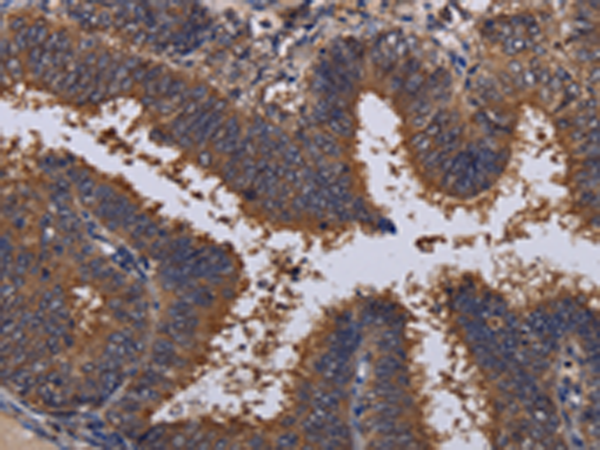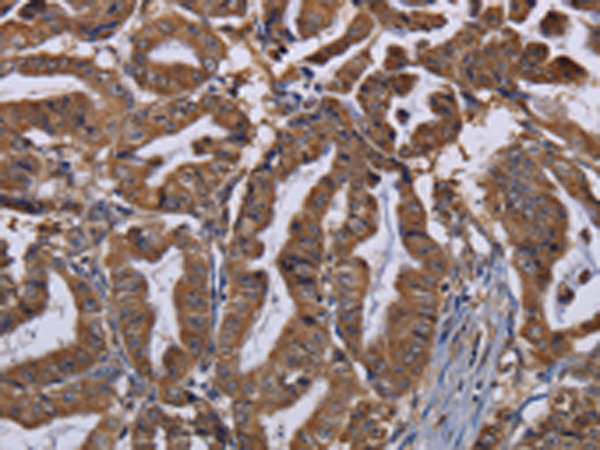


| WB | 咨询技术 | Human,Mouse,Rat |
| IF | 咨询技术 | Human,Mouse,Rat |
| IHC | 1/50-1/200 | Human,Mouse,Rat |
| ICC | 技术咨询 | Human,Mouse,Rat |
| FCM | 咨询技术 | Human,Mouse,Rat |
| Elisa | 1/1000-1/2000 | Human,Mouse,Rat |
| Aliases | MCT1; MCT-1 |
| WB Predicted band size | 21 kDa |
| Host/Isotype | Rabbit IgG |
| Antibody Type | Primary antibody |
| Storage | Store at 4°C short term. Aliquot and store at -20°C long term. Avoid freeze/thaw cycles. |
| Species Reactivity | Human |
| Immunogen | Fusion protein of human MCTS1 |
| Formulation | Purified antibody in PBS with 0.05% sodium azide and 50% glycerol. |
+ +
以下是关于MCTS1抗体的3篇参考文献,涵盖其在不同癌症中的功能研究及抗体应用:
---
1. **文献名称**:*MCTS1 promotes oncogenesis in breast cancer via β-catenin stabilization*
**作者**:Huang Y, et al.
**摘要**:该研究通过免疫组化和Western blot使用MCTS1抗体,发现MCTS1在乳腺癌组织中高表达,并通过稳定β-catenin增强Wnt信号通路,促进肿瘤增殖和转移。抗体实验证实MCTS1与β-catenin的直接相互作用。
2. **文献名称**:*MCTS1 amplification in T-cell lymphoma drives oncogenic signaling and chemoresistance*
**作者**:Lee S, et al.
**摘要**:研究利用MCTS1抗体进行免疫沉淀和流式细胞分析,表明MCTS1在T细胞淋巴瘤中因基因扩增过度表达,激活PI3K/AKT/mTOR通路,导致化疗耐药性。抗体实验为靶向治疗提供了分子机制依据。
3. **文献名称**:*MCTS1 as a novel prognostic biomarker in non-small cell lung cancer*
**作者**:Zhang L, et al.
**摘要**:通过免疫组化(使用MCTS1抗体)分析肺癌患者样本,发现MCTS1高表达与预后不良相关。研究显示MCTS1通过调控细胞周期蛋白加速肿瘤进展,提示其作为潜在治疗靶点的价值。
---
以上研究均依赖MCTS1抗体进行蛋白定位、表达量检测及机制探索,强调了其在癌症研究中的关键作用。
The MCTS1 (Malignant T-Cell-Amplified Sequence 1) gene, also known as MCTS1. encodes a protein implicated in regulating cell proliferation, translation, and oncogenesis. Initially identified through its amplification in aggressive T-cell lymphomas, MCTS1 is overexpressed in various cancers, including breast, colorectal, and hepatocellular carcinomas, correlating with poor prognosis. The protein interacts with translation initiation factors and mRNA-binding partners, potentially modulating the synthesis of oncogenic proteins like MYC. Its role in enhancing cap-dependent translation and promoting cell cycle progression highlights its significance in tumorigenesis.
MCTS1 antibodies are critical tools for studying its expression, localization, and function in cancer biology. They enable detection of MCTS1 in tissues or cell lines via techniques like Western blotting, immunohistochemistry, or immunofluorescence, aiding in biomarker validation. Researchers also use these antibodies to explore MCTS1's mechanistic contributions to therapy resistance or metastasis in preclinical models. Recent interest in targeting MCTS1 for anticancer therapies has spurred the development of inhibitory antibodies or small molecules. However, the protein's complex interactions and context-dependent roles necessitate further investigation. MCTS1 antibodies thus serve as both diagnostic probes and functional tools in unraveling its oncogenic potential.
×